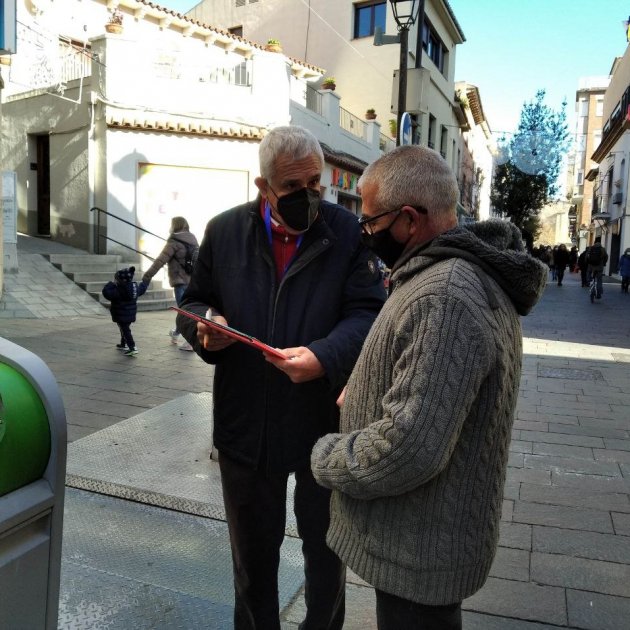As the countdown goes on to Catalan elections which may or not take place as scheduled on 14th February, a key deadline has just passed for some of the minor parties - one which determines who can stand and who can't. It's the cut-off point for presenting avals - voter endorsements.
Parties that currently have no MPs in the Catalan chamber have to present a minimum number of such endorsements - to be precise, 5,600 signatures in total, spread across the four Catalan constituencies, a figure that corresponds to 0.1% of the Catalan electoral role. It has always been a challenge for small parties outside Parliament, as their absence from the day-to-day of representative politics leaves them forgotten by most of society. This year, the challenge has become quite Herculean due to the pandemic.
The process of obtaining endorsements necessarily involves collecting signatures in person, which is very difficult taking into account the multiple and changing restrictions on mobility that have emptied the country's streets. There is also the option to do it via electronic signatures, but a digital certificate is needed and the truth is that few people have it.
However, there is one party required to present its 5,600 names that has had no problem. This is Together for Catalonia (JxCat), an exceptional case, as the aprty led by president in exile Carles Puigdemont is in reality quite the reverse of an un-represented party. But it's divorce with the Catalan European Democratic Party (PDeCAT) and the fact that the latter was adjudged as being left with the legacy of the electoral rights forced the candidacy of Laura Borràs to comply with this formality, which in the JxCat case was truly just a formality.
JxCat's collection of endorsements led to long queues. / Foto: @aalbeert
Within just a few days, JxCat presented a total of 52,000 endorsements, about ten times as many than the 5,600 signatures needed. The Spanish far-right group Vox, standing for the first time in a Catalan election, also reached the required number very quickly. Both parties have a high profile due to their daily participation in institutional politics.
The real extra-parliamentary parties
Did the JxCat overkill perhaps create problems for other new pro-independence parties to seek a seat in Parliament? A single person is not allowed to give two different endorsement, and anyone who does, will have both signatures annulled. In fact, from the Primàries organization, there were accusations that JxCat members had lied to people, assuring that more than one option could be endorsed. In response, JxCat did not want to get into the controversy.
Precisely Primàries is one of the candidacies that has obtained all the guarantees for the four demarcations. The organization that aims to be a grassroots-based unifying pro-independence party had already confirmed that it had the necessary signatures in Girona, Tarragona and Lleida, and this Monday confirmed that it had also reached the figure in Barcelona, where their number one candidate leader / herself winner of a primary election process in which they almost 6,000 people took part, is Laura Ormella.
Another candidature which has gained the required signatures is the new Catalan Nationalist Party (PNC) led by Marta Pascal, formerly of PDeCAT. Pascal herself confirmed this via Twitter: "Anyone who doubted that the PNC would be present in the elections, today received a first lesson in humility and realism. 8,336 thanks! We will change everything!".
The third and last pro-independence candidacy that seems to have got over the hurdle of the endorsements is the right-wing National Front of Catalonia (FNC). Late on Monday, the party to be led by the president of the business group Cercle Català de Negocis, Albert Pont, reported that it had presented "the documentation required by the Electoral Commission in the four Catalan constituencies". The group reported receiving threats and harassment during the collection of signatures in towns such as Olot, Arenys de Mar, Sabadell and Vilanova, and asserts that it has already laid legal complaints as a result.
Due to its last-minute presentation of the required signatures, some media and political voices asserted that FNC had failed to get the required support. The party denied this.
Now, the Central Electoral Commission has to validate the endorsements presented by these three parties.
Those who didn't make it
Those who failed to reach the goal by the deadline include been the Unitat Primer d'Octubre coalition, formed by Força Catalunya, the Bloc Sobiranista Català and the Partit Nacionalista Andalús, the Coalición de Represaliades (CR) —led by activist Roger Español — and the animal rights party PACMA.
In fact, the animal rights party already presented an administrative appeal on December 28th with the Catalan High Court, requesting either the suspension of the elections or the abolition of the endorsement requirements. The party's case was also backed by the Unitat Primer d'Octubre group. The animalists allege "a possible violation of fundamental rights" due to the difficulties in collecting signatures in the middle of the health alert.
Other new parties didn't try to get their own endorsements directly, for different reasons. The Lliga Democràtica and Lliures hoped to run with the PSC, but as they failed to reach an agreement with the Socialists they will not be present in the end. Aliança Catalana, a group promoted by former Ripoll councillor for the FNC, Sílvia Orriols, already confirmed a few days ago that she would not run in the elections to focus on "building a strong party".
